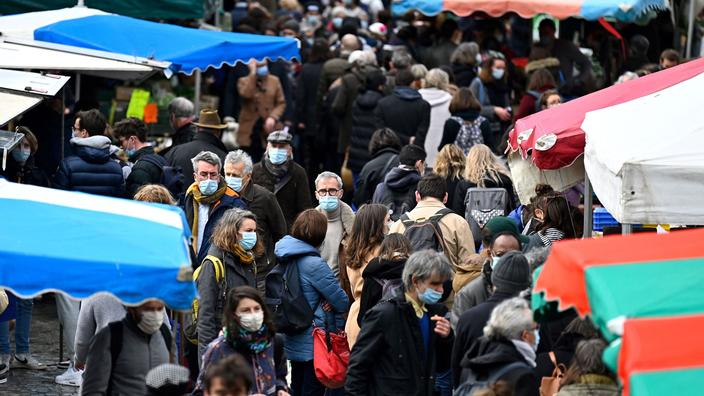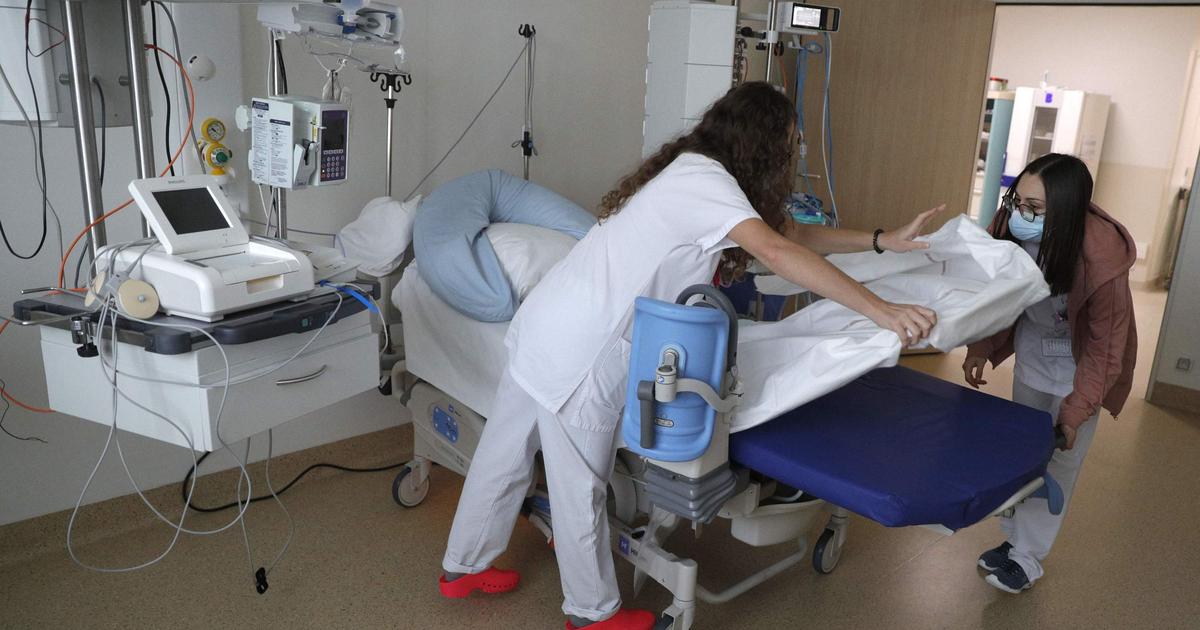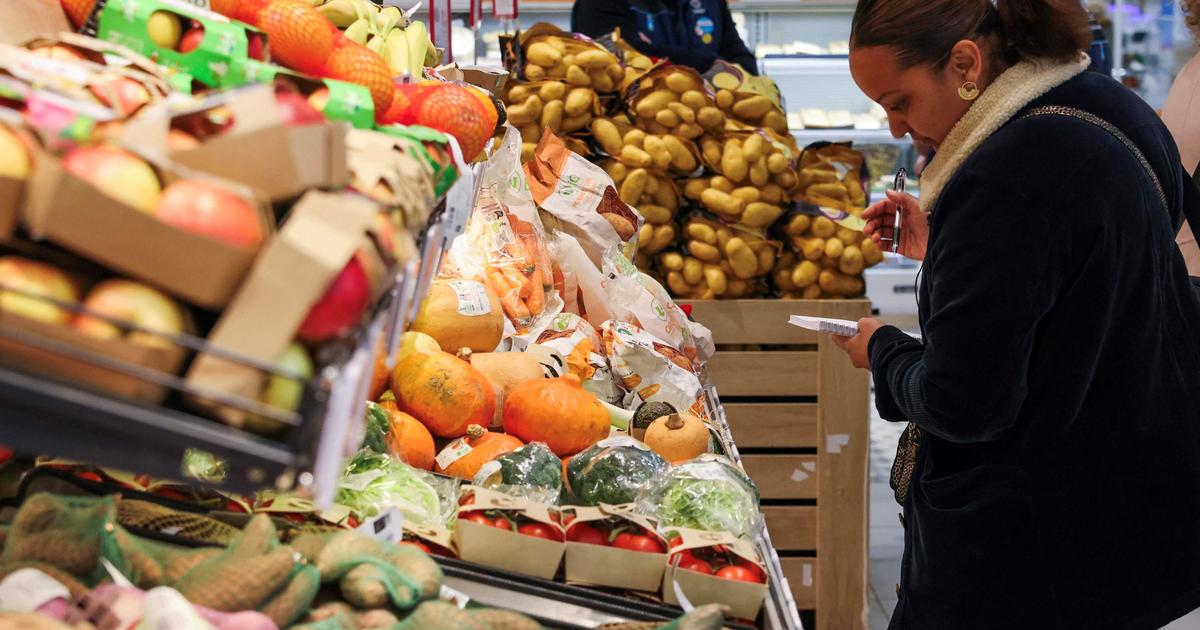The Covid-19 epidemic and its health consequences had immediate effects on French purchases and their consumption patterns.
At the same time, certain trends have accelerated and should be firmly established after this crisis.
Looking back on an extraordinary year, also in terms of consumption.
Back to basics
Deprived of leisure and travel for a good part of the year, the French have generally spent less for a year.
Evidenced by the accumulated savings: 200 billion euros set aside.
They focused on products deemed “
essential
”.
The images of shelves of essential products (pasta, rice, canned food, toilet paper, etc.) robbed on the eve of the first confinement are emblematic in this respect.
To read also: Pasta, flour, toilet paper: the psychological springs of "panic purchases"
Hygiene products
At the time of Covid-19, hygiene and self-protection products were very successful.
Obviously, one of the major trends of the past year are masks (464 million euros in turnover between May and December 2020, according to a study by the Nielsen cabinet).
Hydroalcoholic gels also have a strong rating (+ 87 million euros in sales), as do liquid or solid soaps (sales up + 42% compared to 2019).
It must be said that washing your hands several times a day has become a reflex.
Products to disinfect its interior, such as wipes, household gloves or bleach were also very sold (+ 23% of turnover) last year.
Food
The average basket of consumers in 2020 is full of food.
After massively stocking non-perishable foodstuffs, such as pasta, rice, sandwich bread, preserves, but also frozen products and ready-made meals, during the spring containment and the few days that followed, the French are then put to cook and especially, to make cakes.
Flour, yeasts and flavored sugars were very successful during this period.
Deprived of restaurants and company canteens for more than 6 months between March 2020 and March 2021, the French ate more at home and therefore spent more in food stores.
Supermarkets but also traditional
food
shops and specialized brands (Picard, Grand Frais, etc.) have thus fared well. “
These food expenses represented 14 billion euros less for the food industry. catering
”, emphasizes Emily Mayer, Business Insight Director (commercial perspectives) at Iri, an institute specializing in the analysis of consumer product data.
The return of the do-it-yourself
Tutorials and kitchen machines
Condemned to spend more time locked up at home, the French went back to cooking.
They've followed cooking recipe tutorials on YouTube more than ever.
During the first lockdown, videos on how to make your own bread have never been so popular;
they were looked at nine times more compared to 2019. "
In the second half and during the second confinement, burger bread and sliced cheeses are also growing strongly, as well as Tex Mex kits
," notes Emily Mayer.
This enthusiasm for the kitchen was found in the purchases of small appliances which soared.
Sales of coffee makers, multifunction kitchen machines, or even cooking appliances (multicookers, fryers, mini ovens) jumped in 2020, by more than 25% depending on the product, according to the annual report of Gifam, the grouping of brands of home appliances.
In 2020, 56.4 million devices were sold, nearly one per French person.
Hair clippers and DIY
Doing it yourself is also found in the maintenance of your body.
While hairdressers, barbers and beauty salons were closed during the two confinements, hair dyes, hair removal devices and hair clippers sold well.
“
Sales of hair color and hair removal products are growing strongly.
Even from June to October - when the shows reopened - these products continued to sell well.
Consumers have discovered that they were doing the work
"
,
underlines Guénaëlle Gault, CEO of Obsoco.
“
On the other hand, sales of deodorants, perfume, hairspray, make-up, these products that can be classified in the category of social interactions, are at half mast.
"
Assigned to homes, the French focused more on maintaining their home.
The objects of the house have been on the rise for a year.
Between the two confinements, the furniture and home market experienced a strong increase (+ 13% between August 2019 and August 2020).
“
We observe a great refocusing at the level of his house, the French have invested in living space, in small appliances, multimedia.
They did small jobs in their accommodation.
DIY
stores
have not suffered from the crisis,
”observes Guénaëlle Gault.
After rediscovering their home during confinement, the French continued to take care of it.
At the start of September, the was still far above what the DIY sector usually sees.
Read also: The French enthusiasm for DIY is not waning
More local and responsible consumption
In 2020, the French have also rediscovered local shops.
The frequentation of small surfaces has increased.
During the second reconfinement, initiatives to help small businesses to sell online have multiplied to allow purchases in convenience stores, facing large distribution.
“
We are seeing a great refocusing on the local, Made in France, local products.
The brands have understood this well and most are trying to play with it,
”emphasizes the director of Obsoco.
The desire for sustainable consumption has increased.
According to the first study by the “
Food and Families
”
observatory
published by the Nestlé Foundation with Ipsos, the French now favor responsible food: 51% more often or recently say they favor local foods or foods produced in France.
Attention is also increasingly focused on organic, favored by 45% of respondents.
Digitization of consumption patterns
The year was also marked by an acceleration in the digitization of lifestyles and consumption.
With the rise of teleworking (1/3 of working people), the French took the opportunity to buy or change computer or invest in a printer.
"These
goods, which now have a central place in interiors, are also used for communication and entertainment
" underlines Guénaëlle Gault.
Video games exploded last year.
The crisis has also reinforced the enthusiasm of the French for video streaming, who devote 15 euros per month to it.
Read also: 2020, the year of all records for video games
2020 marks the boom in e-commerce.
Online sales reached 112 billion euros in France in 2020. Distance shopping, which represented 9.8% of retail trade in 2019, now accounts for 13.4%.
"
The two periods of confinement have led to unprecedented peaks of activity in the online sale of products
", notes Fevad, but "
between these two periods sales remained at a high level
".
According to Obsoco, one in five consumers, driven by protection against the virus, took up online shopping for the first time in the past year.
A practice now firmly established.















